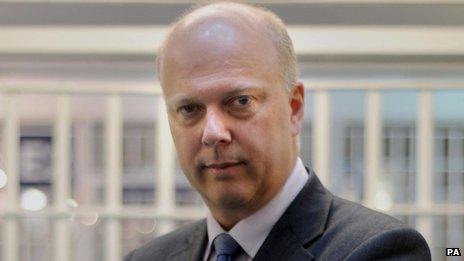Can outsourcing probation services cut reoffending rates?
- Published

Prisoners who have served less than 12 months have the highest reoffending rates
Lee has got something to say.
Something he is ashamed and embarrassed about.
The 39-year-old Londoner is sitting with his probation officer at a cafe in Bristol, where he now lives.
He takes a sip of coffee and a deep breath - and confesses that in order to feed the heroin addiction that has blighted his adult life he has burgled thousands of houses.
And he's been caught so many times that he's spent more than 20 years in prison.
"It was a vicious cycle," he says.
When he came out of jail, his drug use would "spiral", he would commit crimes, and then be arrested and imprisoned again.
But over the past six months Lee has turned a corner.
'Measurable impact'
A face-to-face meeting with two householders whose homes he had broken into convinced him it was time to change.
"I was sick of creating victims," he explains.
With the help of probation and other professionals he is trying to come off drugs and go straight.

Peterborough Prison's rehabilitation model has been closely watched
But the government believes there are too many offenders like Lee - too many people stuck in a revolving door of crime, prison, crime, prison.
So it is introducing radical reforms in an attempt to lower reoffending rates and cut the costs to the criminal justice system.
The key plank of the reforms involves outsourcing the majority of probation work to private firms and voluntary groups.
They will be awarded contracts to supervise low- and medium-risk offenders - there are currently about 160,000 across England and Wales.
The successful bidders will receive a basic fee for monitoring offenders, which will be topped up if they meet targets to cut reoffending - an approach known as payment-by-results.
It is similar to a scheme at Peterborough Prison in Cambridgeshire where, since September 2010, short-term prisoners have been given intensive supervision on release.
Risk register
Chris Grayling, the justice secretary, says Peterborough is a "snapshot of where this world is heading" and is having a "measurable impact" on reoffending rates and the number of crimes committed.
Interim figures published by his department appear to support his contention: reoffending rates among the Peterborough prisoners are falling, while among a national sample of offenders they are increasing.

The justice secretary has placed an emphasis on monitoring short-term offenders
But Carol Hedderman, a criminologist from Leicester University, says the statistics do not compare like with like.
"The bottom line is that these results don't tell you anything very much," says Prof Hedderman, who is part of an independent team commissioned by the Ministry of Justice to examine the Peterborough project.
"Until we do our much more detailed and sophisticated analysis you won't know the answer to that question as to whether Peterborough has been a success or not," she says, adding that she has not yet seen any examples of effective payment-by-results schemes.
There are other warning signs about the government's probation reforms.
BBC File on 4 has been shown a "risk register" - a document compiled by civil servants to gauge which parts of the reforms could be problematic.
It sets out risks ranging from a failure to deliver the reforms on time and to a sufficient standard, to reputational damage to the Ministry of Justice.
A second, more recent, risk register written by probation managers paints a similar picture.
But Mr Grayling says the documents are designed to ensure that risks are planned for.
"It would alarm me if the team running the project and my team here wasn't thinking of the consequences of things that could go wrong and wasn't taking steps to make sure they didn't," he says.
Appeals lodged
The probation union, Napo, is considering a legal challenge against the government to halt the reforms - one of the potential grounds is that ministers acted unreasonably because they knew the reforms were fraught with difficulty.
Napo, which represents more than 7,000 staff, is also concerned about the process for allocating probation officers to their roles in the new system.
Some are being told they will be working for the outsourced organisations, to be known as community rehabilitation companies.
Others will be employed by a new public body, the National Probation Service, which will deal with high-risk offenders including sex attackers and those convicted of serous violence.
Napo says 553 probation officers from about half of the probation areas have lodged appeals against the roles they have been assigned - with 119 successful so far.
Mr Grayling says the number of appeals is a "tiny fraction" of what he was expecting - but it is expected to increase significantly as more staff are told where they will be working.
The changes have driven Joanna Hughes, deputy chair of Napo in Gloucestershire, to make a momentous decision.
After 16 years in probation she is quitting and is considering standing as an independent parliamentary candidate at the next election to campaign against the reforms.
She believes that dividing offender supervision between different bodies will lead to communication problems and make further offences more likely.
"All the reasons I became a probation officer are now being destroyed," she says.
Pressing ahead
Joanna won't be the only one to depart. File on 4 has learned that ten of the 33 most senior probation officials plan to leave when their probation trusts are abolished as part of the reforms.
The Probation Chiefs Association says it represents a loss of "hundreds of years of experience".
But the justice secretary is pressing ahead with the changes, due to be in place by April next year, before the general election.
Under his reforms, almost 50,000 adult offenders released from jail terms of under 12 months will be monitored on release.
They are the group with the highest reoffending rates, but there is currently no legal requirement for them to be supervised.
Mr Grayling says at last they will leave jail with more than just a cash discharge grant of £46.
But if the reforms are to work, then more offenders like Lee, the heroin addict and repeat burglar, will have to be motivated and given the right help.
"A lot of clients will stick their fingers up," says an unconvinced Lee.
"They'd rather go to jail and sit in jail with a telly, three meals a day, than being out here, being on tag."
File on 4 will be broadcast on BBC Radio 4 at 20:00 GMT on Tuesday 18 February.
- Published18 February 2014
- Published21 November 2013
- Published5 November 2013